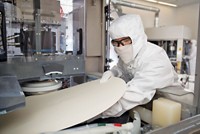Advertisement
Grab your lab coat. Let's get started
Welcome!
Welcome!
Create an account below to get 6 C&EN articles per month, receive newsletters and more - all free.
It seems this is your first time logging in online. Please enter the following information to continue.
As an ACS member you automatically get access to this site. All we need is few more details to create your reading experience.
Not you? Sign in with a different account.
Not you? Sign in with a different account.
ERROR 1
ERROR 1
ERROR 2
ERROR 2
ERROR 2
ERROR 2
ERROR 2
Password and Confirm password must match.
If you have an ACS member number, please enter it here so we can link this account to your membership. (optional)
ERROR 2
ACS values your privacy. By submitting your information, you are gaining access to C&EN and subscribing to our weekly newsletter. We use the information you provide to make your reading experience better, and we will never sell your data to third party members.
Biological Chemistry
ACS Honors Heroes Of Chemistry 2011
AstraZeneca and DuPont chemists applauded for breakthroughs
by Susan J. Ainsworth
October 17, 2011
| A version of this story appeared in
Volume 89, Issue 42

For their exceptional work to discover a drug to treat lung cancer and to develop innovative chemistry to improve DNA sequencing technology, three industrial scientists from two companies were named as this year’s Heroes of Chemistry. They were recognized on Aug. 28 at a formal dinner during the American Chemical Society national meeting in Denver.
Established in 1996, the ACS Heroes of Chemistry program honors scientists whose work in chemistry and chemical engineering has led to commercially successful products or technologies that benefit humankind. “It celebrates the scientists behind discoveries that save lives, improve everyday life, and revolutionize science,” said ACS President Nancy B. Jackson at the event.
Each year, an ACS panel selects the Heroes of Chemistry from a pool of chemical scientists nominated by their own companies. The innovations that the award honors are the “result of the support and vision of corporate management, who invest in science, understand its application, and advocate for it within their organizations,” Jackson said.
Two of this year’s heroes are AstraZeneca scientists who discovered and developed Iressa (gefitinib), an epidermal growth factor receptor (EGFR) tyrosine kinase inhibitor, for the treatment of advanced or metastatic non-small-cell lung cancer. Honored were Andrew J. Barker, formerly director of chemistry for oncology innovative medicines at AstraZeneca, and Keith H. Gibson, who was the team leader for the cancer and infection research area, but has now retired.
In Iressa, they developed one of the first protein kinase inhibitors to demonstrate utility as an antitumor agent. As an EGFR inhibitor, Iressa “helps regulate intracellular signaling pathways implicated in cancer cell proliferation and survival,” Jackson said. “This signaling has been identified as a key driver of tumor growth in a wide range of cancers.”
More than 300,000 patients have been treated with Iressa, which is now approved in 76 countries. The treatment generated sales totaling $637 million in 2010.
Also recognized as a Hero of Chemistry is former DuPont scientist George L. Trainor, who developed innovative chemistry underlying a major advance in DNA sequencing technology. Now retired, Trainor was a member of DuPont Central Research & Development when he was investigating DNA sequencing in the late 1980s.
Trainor developed a method of dye-terminator DNA sequencing, which involves labeling of the chain-terminating nucleotides. Unlike the traditional Sanger method, Trainor’s fluorescence-tagged terminator technique can easily be automated and does not require use of radioactive substances. Automation of DNA sequencing allows scientists to analyze unprecedented amounts of DNA, making it possible to decode an entire human genome containing more than 3.4 billion base pairs and 20,000 to 25,000 genes, Jackson said. The approach is now the dominant DNA sequencing method.
DuPont marketed and sold Trainor’s DNA sequencing method under the name Genesis 2000 DNA Analysis System and later licensed the technology to Applied Biosystems. The market for DNA sequencing methods is expected to exceed $1 billion this year.
The advances made possible by the work of this year’s Heroes of Chemistry “have saved or improved lives around the world—embodying the ACS vision: improving people’s lives through the transforming power of chemistry,” Jackson said. “It is a source of great pride to us at ACS that in each case, fundamental science has been brought to the marketplace to benefit all of us.”
Nominations for the 2012 Heroes of Chemistry program will be accepted between January and mid-April 2012. Visit www.acs.org/awards for further information.




Join the conversation
Contact the reporter
Submit a Letter to the Editor for publication
Engage with us on Twitter